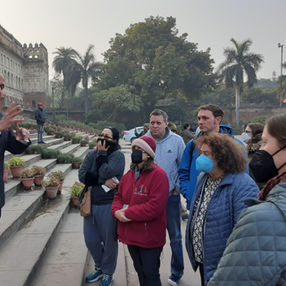
CAORC-AIIS FACULTY DEVELOPMENT SEMINAR
Entrepreneurship, Energy, Education, and Peace: Understanding Indian Innovation
India

Seminar Overview
This seminar examines how India has been an innovative partner for the last 75 years in the fields of entrepreneurship, energy, education, and peace and security. From even before its independence in 1947, India has led the way in advocating for a more peaceful world through diplomacy, trade, and economic development. Faculty participants will explore how India has promoted small-businesses, including a focus on handicrafts and self-sustaining industries, vocational training, cultural heritage, and diplomacy, as well as industry aligned instruction in high-demand sectors, including advanced manufacturing, and technology. Through direct engagement with university faculty, small businesses and workshops, training institutions, and cultural centers, participants will learn how India has positioned itself internationally as an important economic, diplomatic, and technological center of power.
Designed for U.S. college faculty and administrators, the program will explore India’s strategies for building local economies, promoting peace and security, and designing innovative educational systems. This program supports U.S. priorities in economic competitiveness, energy security, person-to-person diplomacy, and workforce development. Participants will connect with Indian university faculty, community leaders, and NGOs to produce useful curriculum modules about the seminar themes to be presented on the American Institute of Indian Studies website for wider use in U.S. college classrooms.
This seminar, administered by CAORC in collaboration with its member center in India, the American Institute of Indian Studies, funds participation in a two-week seminar that will include visits to Delhi, Jaipur, and Jodhpur. The award covers international airfare, lodging, internal transportation costs, program fees, and selected meals.
This program is contingent on funding.
Seminar dates: January 3 - January 17, 2026 (tentative, exact dates TBD)
Meet the AIIS Seminar Leaders

Professor Amar Sawhney
Professor, Miami-Dade College

Jessica R. Barnes
Associate Teaching Professor, Northern Arizona University
Eligibility
The program is open to full-time or part-time faculty and administrators at U.S. colleges and universities. The program is open to faculty in all fields, at all academic ranks, and from any academic or administrative department. Priority will be given to faculty and administrators at institutions without a dedicated South Asian Studies program.
Applicants must be U.S. citizens at the time of application and must hold a valid, current U.S. passport that does not expire within six months of the last date of the program.
Previous Overseas Faculty Development Seminar awardees are requested to observe a one-year waiting period before applying for another program. (e.g., a January 2025 participant would next be eligible to apply in winter of 2025/2026, and participate in Summer 2026.)
Note: Awardees will be required to apply for a visa directly from the government of India. While CAORC and AIIS staff will offer information and guidance to assist with the application, participants must apply independently. The acquisition of a visa application is required for participation in the OFDS program.
Program Expectations
As an outcome of the Overseas Faculty Development Seminar program, participants are required to develop and implement a project on their campus. Details and examples of these projects will be shared with awardees during pre-departure orientation. Projects should be implemented within one year of the conclusion of the program, at which time participants will be asked to share curriculum and/or documentation and submit a project report and/or curricular resource to be shared on the AIIS website. To learn more about the projects and see examples, sign up for one of our OFDS webinars.
Application Process
Applications can be accessed via CAORC's SM Apply application portal. You must sign up for an account to access the seminar application. This will allow you to save and return to your application before submitting. Please save your login/password information for future applications.
The application consists of four questions to be answered in essays of 500 words or less. In addition, applicants are required to:
-
Upload a current cv/resume (maximum of 3 pages)
-
Request a letter of support from a department chair, academic division head, or academic dean at your college or institution. You will be able to send a link to your recommender via the online grant portal, SM Apply, by entering their contact details, which will trigger the system into sending an automated email. Your recommender will then be able to upload their letter. Recommendation letters will be confidential in the system.
In their letter, the recommender should address the following questions/points:
-
Please tell us why you support the applicant’s participation in the CAORC faculty development seminar. From your perspective, how will they benefit professionally from the program?
-
Please describe the applicant’s engagement with your institution’s internationalization efforts and how their participation in the seminar might benefit students, colleagues, and the broader campus community.
-
Please discuss the applicant’s collegiality, teamwork, and professionalism. How have they demonstrated the ability to cooperate, work, and share with others to achieve goals and positive outcomes?
-
It is advisable to enter your recommender's contact details into the recommendation letter section of the application as soon as possible (and click 'mark as complete') so that they have sufficient time to complete and upload their letter. The applicant is responsible for checking in with their recommender to ensure the letter is submitted by the recommender deadline. CAORC is not able to reach out to recommenders on behalf of the applicant.
Opening date for applications: June 25, 2025
Application deadline: September 2, 2025 at 5:00pm ET
Recommendation letter deadline: September 5, 2025 at 5:00pm ET
Notification of award decisions: October 3, 2025
If you have questions, please email: fellowships@caorc.org.


